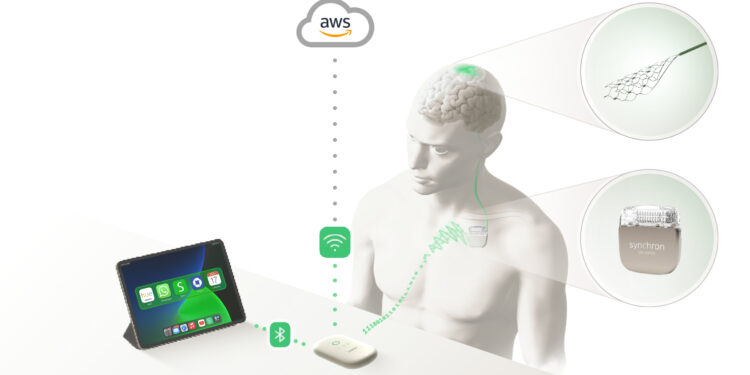Credits: Synchron
A patient with a degenerative disease has been able to command Amazon’s Alexa digital assistant with his mind, the company behind the technology said Monday, allowing him to stream shows and control devices using only his thoughts.
An implant in a blood vessel on the surface of the 64-year-old’s brain allowed him to mentally “tap” icons on an Amazon Fire tablet, brain-computer interface company Synchron said.
The patient, who lives with amyotrophic lateral sclerosis (ALS), was able to make video calls, listen to music, stream shows, control smart home devices like lights, shop online and read books using his mind to direct Alexa, according to the New York-based company.
ALS is a degenerative nerve disease that causes muscle weakness and paralysis.
“Being able to manage important aspects of my environment and control access to entertainment gives me back the independence I’ve lost,” the patient, named only as Mark, said in a statement.
The test was intended to show how customers could use just their minds to control smart homes with Alexa-enabled devices like doorbell cameras, plugs and thermostats, the company said.
“While many smart home systems rely on voice or touch, we send control signals directly from the brain,” Tom Oxley, founder and CEO of Synchron, said in the release.
Credits: Synchron
“Patients can interact with devices in their home without having to use their hands or voice, using only their thoughts.”
Several companies, including Elon Musk’s Neuralink, are working on connecting brains to computers.
In January, Neuralink implanted a brain in a man paralyzed after a diving accident. Elon Musk, who also owns Tesla and X, touted the implant as a success.
In July, he said his startup was “moving on” to a second test patient as its technology improved.
© 2024 AFP
Quote: Brain implant lets man control Amazon’s Alexa with his mind (2024, September 16) retrieved September 16, 2024 from
This document is subject to copyright. Apart from any fair dealing for the purpose of private study or research, no part may be reproduced without written permission. The content is provided for informational purposes only.



